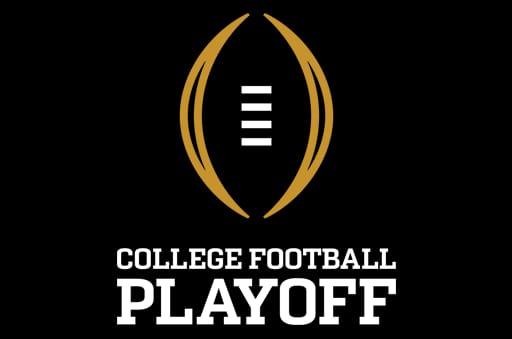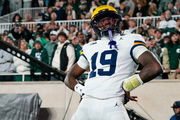

The College Football Playoffs rankings are here. Unbeaten and unbothered, Ohio State holds the No. 1 spot with statement wins over Texas and Illinois. Some say this squad might outshine last year’s title team. Indiana, Texas A&M, Alabama, and Georgia round out the top five. While the College Football Playoff rankings have drawn plenty of attention, a former LSU Tigers coach has put on the critical glasses to point out the faults in the College Football Playoff Committee.
Watch What’s Trending Now!
On the November 5th episode of the Big Ten Network podcast, host Dave Revsine invited former LSU Tigers head coach Gerry DiNardo. He’s questioning whether the current College Football Playoff committee members are genuinely qualified to select the best 12 teams.
“Well, first of all, they’re going to talk about the three or four coaches they have on the committee as we go forward. You know, if they’re bragging about three or four, why isn’t it 12 expert people in the game of football? You don’t have to be a coach to be an expert in college football,” the former head coach came with a blunt jab.
ADVERTISEMENT

Imago
college football generic
To DiNardo, the sample size of decision-makers is too small. This may increase the likelihood of bias or inconsistency. To him, it won’t be possible for the handful of College Football Playoff committee members to fairly or accurately represent all regions, conferences, and perspectives in college football. Even before DiNardo, the College Football Playoff Committee caught side eyes from Florida AD Scott Stricklin back in May this year.
Since 2014, the College Football Playoff’s fate has rested in the hands of 13 deciders, but as Stricklin put it, football isn’t basketball. With fewer games and thinner data, picking playoff teams is an unfamiliar landscape. For most of its history, college football crowned champions without a selection committee, relying instead on media and coaches’ polls to name the nation’s best. Then came the BCS in 1998, a computer-driven system that ranked teams and matched the top two for a title showdown.
ADVERTISEMENT
However, controversy and debate peaked. This led them to devise a solution, and the College Football Playoff committee was established. But there persist issues. As pointed out by DiNardo, “I don’t think the committee is qualified to pick out the best 12 schools. You mentioned Memphis. I believe Utah was ranked 13th, if I’m not mistaken. So, they don’t get to play for the national championship because this group of five teams is automatically in the playoffs. So, those are my complaints.”
The College Football Committee might have considered tempering the heat with the “eye test” method announcement.
ADVERTISEMENT
Why does the eye test rule the College Football Playoff Committee?
The 2025 College Football Playoff selection committee features stalwarts like Chris Ault, Mark Dantonio, and Troy Dannen, among others. Mack Rhoades, the committee chairman and athletic director at Baylor, emphasized the importance of both the “eye test” and traditional statistics in forming his conclusions. Time to take a deep dive into what it is.
“I think we refer to it as art and science,” said Rhoades. When the committee rolled out its picks, the “eye test” took center stage. Stats might shape the rankings, but film tells the truth: who hits harder, moves faster, and owns the line of scrimmage. As Rhoades noted, the tape doesn’t lie; it reveals a team’s absolute power and poise.
ADVERTISEMENT
The first College Football Playoff rankings reveal says it all. Yes, it’s simple to decode that Ohio State’s still king. Yet, the crown’s wobbling. Indiana and Texas A&M are breathing down the Buckeyes’ necks, and they are both unbeaten and hungry. The Aggies, though, have the loudest case: a 41-40 stunner at Notre Dame and a more challenging road than either Big Ten rival ahead of them.
Top Stories
Sean Payton Announces Retirement Plans as Broncos HC Demands Improvement From Bo Nix & Co. Before Playoffs

Greg Biffle’s $4M Worth Prized Possession Still Without a Buyer Leaves NASCAR Fans Heartbroken

LIV Golf Braces for Another Possible Exit in Wake of Brooks Koepka Departure

Biff Poggi All But Confirms Bryce Underwood’s Michigan Future After Announcing His Own Departure

Roger Federer Draws Criticism from Swiss Government Chief for Tourism Boom in Country

NASCAR World Mourns as Former Watkins Glen President Michael Printup Passes Away at 60

While the College Football Playoff committee relied on the eye test, it drew more criticism. The reason? Memphis is missing from the committee’s first top 25, but the American Conference Tigers would still sneak in as the 12th seed, ranked fifth among conference champions. Therefore, Gerry DiNardo’s raised points warrant further discussion.
ADVERTISEMENT
ADVERTISEMENT
ADVERTISEMENT

